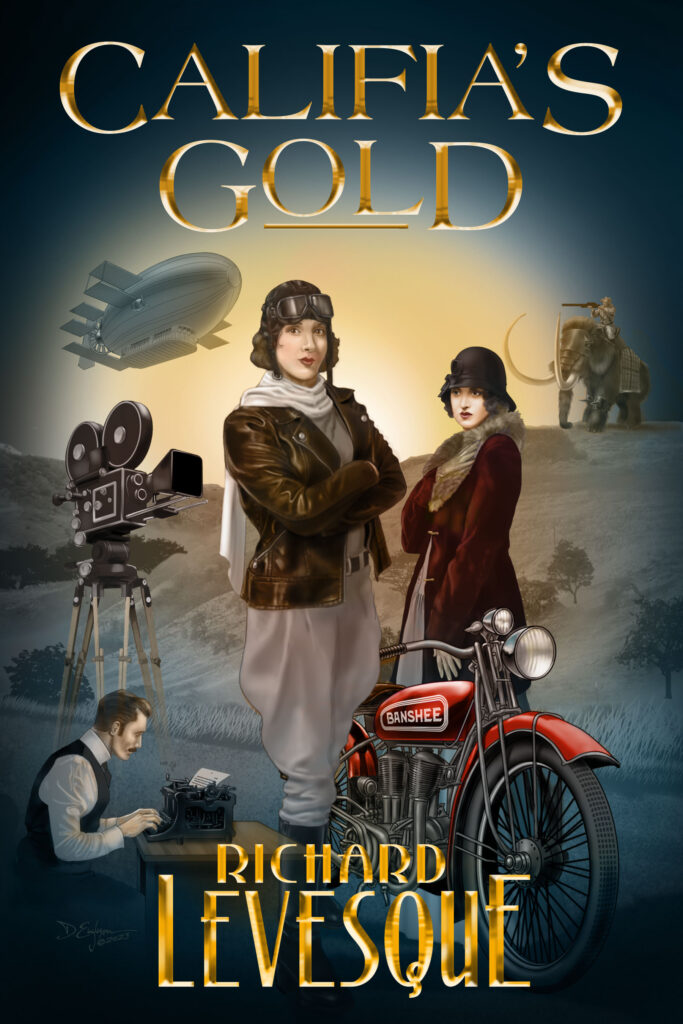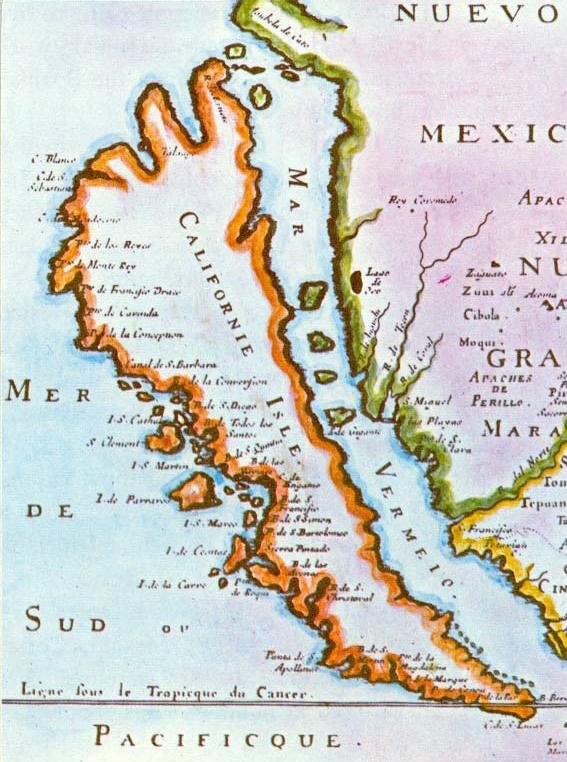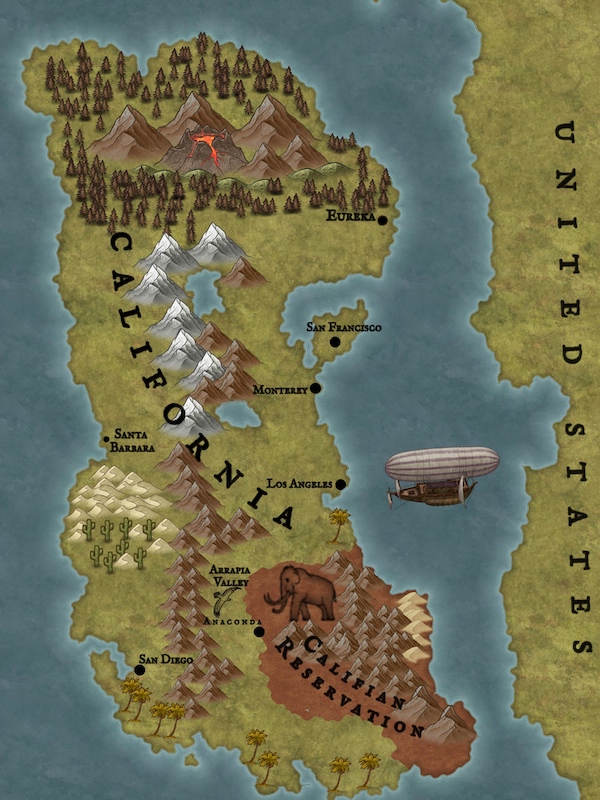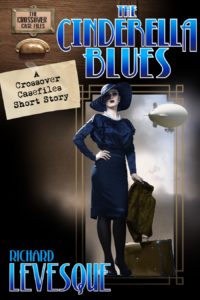Califia’s Gold is Coming Soon

I’m very pleased to announce the release of my new steampunk novel, Califia’s Gold, in just a few days! As you can see, the cover is another brilliant effort from Duncan Eagleson at Corvid Design, and I’ve got a little background on the novel and a sneak peek for you.
Anyone who went to fourth grade in California likely recalls the California history units that I believe are still part of the curriculum. For my generation, that meant making sugar cube models of the Spanish missions that run up and down the state. More recently, kids have gotten the option of making dioramas that depict Native American life during the same period, doing video or web-based projects on the missions, etc.
Other than the mission project, one thing I distinctly remember learning about was that the 15th Century Spaniards misunderstood California geography. I recall an old map in a textbook showing California as an island and a description of a race of Amazon-like women who lived there, ruled by a queen named Califia. For some reason, the map and the story made an impression on me. I won’t say it sparked my imagination and led me to write this book almost fifty years later, but there was something about the story that stuck with me.
It was only later in life that I did a little digging and learned that the Spanish explorers along the Mexican coast looked out at the tip of the Baja peninsula and assumed it was an island, possibly led to believe this because of stories told to them by the natives. It didn’t take long for the “island” to become associated with Garci Rodríguez de Montalvo’s 1510 novel, Las sergas de Esplandián in which there is an island called California, ruled by Queen Califia, perhaps because this fictional island was supposed to be full of riches similar to what the Spaniards were hoping to find in the New World. I have no idea how long it took them to figure out that the island was no island, but that’s how the state eventually got its name.

Jump forward several decades to my work at UC Riverside, studying California literature in preparation to write my dissertation on Hollywood novelists of the 1920s and 30s. I read Carey McWilliams’ 1946 book, Southern California: An Island on the Land, which is a study of the cultural and historical factors that shaped the region. McWilliams emphasizes the sense of separateness the comes over immigrants to California, which contributes to the sense of alienation found in a lot of California literature. Again, the idea of California as an island clicked for me, but once again—there the idea sat.
Of late, I’ve gotten some of my best writing ideas while walking our dog early in the mornings. So when—while rounding a corner with a leash in my hand—I got a picture in my head of a brass periscope rising out of the water, I immediately thought of this happening on California’s east coast.
“And why not?” I thought.
A novel set in a world where Montalvo’s book wasn’t fiction, where California really is in island, seemed like a fun idea. This, of course, required a map of my imagined California, and here it is:

And once I’d broken some rules of reality, more followed. The resulting setting for Califia’s Gold opened up myriad possibilities, many of which I’ve explored in the novel and several more of which are still to come in the following two books that will round out the trilogy.
For now, here’s a sneak peek at the world you’ll be entering when you join the Philby sisters—Beatrix and Arabella—along with aspiring writer Quincy Parmenter and his uncle, the famous novelist Mordecai Flinch. There are also some sinister characters lurking in the shadows and a few more surprises I’ll leave you to discover on your own.
PROLOGUE
Sliding up through the darkness of early morning, a brass periscope broke the surface a hundred yards off California’s east coast. With its lens aimed at the shore beyond the steady roll of breakers, the periscope rotated to the left and then the right, coming to rest at center where it lingered for several seconds before beginning a second sweep. After almost two minutes of surveillance, the brass cylinder submerged again, dropping from the surface as though it had never been there in the first place.
“Nothing stirring, gentlemen,” said the government man as he folded the handles of the periscope and drew his face away from the eyepiece. He was balding and wore a thick brush of a mustache that hid a mouth prone to smiling even though there seemed to be no source of amusement. Now he turned that smile on the men surrounding him and said, “Let’s finish the job we came here for.”
Philip Finlay didn’t trust the government man. He stood among his comrades in uniform and watched the smile, knowing it hid something, just as the mustache hid the government man’s top lip. There was nothing for it, of course. It wasn’t his job to ferret out trouble. When someone gave orders, Finlay followed them. Normally, it was his captain or another superior officer. The fact that it had been the government man running the show for the last month as the crew had trained on the Nevada seashore hadn’t changed anything other than whose orders needed following. Even so, Finlay felt wary while he did his duty.
“It’s time we made history,” the government man said, and Finlay felt his face grow pale as the blood from all the capillaries in his cheeks retreated to the muscles in his arms and legs, ready to respond to the threat that was nothing more than the balding man’s smile.
The circle broke up, each man to his station. Finlay headed to the gunnery port at the foredeck and took his seat as the amphibious vehicle lurched forward on the sea floor. He considered his station the best on the whole machine, a swiveling seat mounted before the broad fore port with a massive Perkins gun connected to it. The muzzle was useless now, the triggers, too, as the gun couldn’t shoot underwater. And that meant that during the whole forty-mile trek along the sea bottom, Finlay had had nothing to do besides take in a show unlike any he’d ever seen during his previous deployments on ships that floated on the sea’s surface.
The Crawler’s lights had revealed the plants on the sea floor, the kelp forests where otters had swum down to get a look at the passing monstrosity, and all the fish that swam and crustaceans that scuttled between the continent and the island past its edge. Steam engines turned the tracks that churned up the muck along the bottom, but the cloudy disturbance sprayed out behind the vehicle with no effect on Finlay’s view.
He stared out now, rapt as the Crawler trudged toward shore, almost able to forget his misgivings about the mission.
“Quite a view, isn’t it?” came a voice from behind him, and before Finlay could turn, he knew who’d come to look through the port with him.
“Yes, sir,” he said, turning to acknowledge the government man.
The smile crept out from below the mustache, but the government man said nothing for several seconds. When he spoke, he didn’t take his eyes off the watery view beyond the glass.
“You looked a little nervous back there, son. Scared?”
Finlay felt himself blush, relieved that the government man didn’t seem to be looking at him. “No, sir,” he said, a bit too quickly.
The government man nodded, still smiling. “What, then?”
Finlay didn’t know how to respond.
“Speak freely, son. I’m not your commanding officer.”
Hesitating a moment, Finlay said, “Not scared, sir. Just confused.”
“By?”
“We’re already at war with Spain, sir. Why are we provoking a fight with California?”
The government man chuckled. “If we were trying to provoke a war, we wouldn’t be traveling under cover of night. And we wouldn’t have traveled the last forty miles underwater.” He put his hand on the wall beside the bulkhead, doubtless able to feel the warmth from the hidden pipes that carried steam through the walls, heating the interior and powering the Perkins gun that Finlay hoped he wouldn’t have to fire. “No, son. This isn’t war. It’s a test. With the U.S. at war, other interests might see fit to invade our island neighbor—the Russians, the Japanese, the Australians. Take its riches for themselves. And we can’t have that happening. An independent California is one thing. A California that’s a Japanese colony…that’s another. This close to our shores. And all that gold and agriculture gone to the emperor. You see?”
“I think so, sir.”
“We need to be able to cross the channel and protect our ally. Not just with conventional transports on the surface or in the air. Not the kind of thing an enemy can see coming. And another reason to do it in stealth is so the Californians don’t think we’re actually invading ahead of the Japanese. So, a secret test of our new amphibian seemed in order. Nothing sinister about that, is there?”
“No, sir.”
The government man clapped him on the shoulder just as the view outside the port made a sudden shift from a serene underwater scene to a churning foam of bubbles.
“Breakers,” the government man said. “We’ll be on the shore in a few minutes. You know what to do, yes?”
“Absolutely, sir.”
“Good man. It’s nothing more than a test of our readiness. We’ve picked a landing site so remote there’s no chance in hell you’ll need to pull the trigger on that thing. Los Angeles is a good two hundred miles up the coast to the north of us. The only thing likely to be seen this far south are lizards and coyotes.” He pronounced the word coy-oats.
With a nod toward the Perkins gun, he added, “And in the off chance some stray Califians show up on the beach, you’d do well not to blast them into eternity, son. Their arrows and spears will never pierce our hull, and no one will ever believe their story. It’s not like they’re running around in the wilderness with an Edison rig to film trespassers on their land.”
The government man chuckled at this and turned to go.
“See you in the history books, son,” he said and then was gone.
Finlay felt considerably calmed by the exchange, so much so that it made him aware he’d been far tenser than he’d realized after the all-hands meeting around the periscope. He leaned forward now, watching as the view through the port transformed to nothing but foam, and then—just as quickly as it appeared—the foam was gone. The underwater insulated lights switched off, and the Drummond lights mounted to the vehicle’s nose and sides switched on, illuminating a wide swath of beach beyond the waves that now lapped around the Crawler’s treads.
Certain that the waves were below the level of the port, Finlay reached forward and popped the seals on either side of the glass, freeing the steel and rubber barrier that had kept water from flooding the chamber. The danger past, he turned the cranks on either side of his seat, edging the Perkins gun and the attached seat forward so the muzzle now poked through the slot in the port—a lethal stinger that he expected would intimidate anyone who caught sight of the amphibious vehicle rising out of the surf.
Moments later, the tracks were on dry sand. The Crawler edged forward and then turned to the left.
South, Finlay thought as he tightened his grip on the Perkins gun’s handles.
A hundred feet or so and they would likely turn back into the water. At that point, the greatest responsibility for the vehicle’s and crew’s safety would fall to Woodbine, the gunner in the rear port.
But five minutes later, they were still heading south.
If their mission really was to prove that the vehicle could cross the channel and return to American soil with a full crew on board, that goal had been half accomplished, Finlay told himself. There was nothing more to be gained from rolling farther south on the massive rubber tracks.
Unless the government man had lied to him.
The first thunk! came a moment later.
It rang against the side of the foredeck with enough force to make Finlay think for a moment that he’d somehow hit his head against the metal walls.
Another of the clanging thuds sounded from somewhere in the chambers to Finlay’s rear, and he heard shouts of alarm from some of the other men.
The vehicle stopped rolling, and Finlay watched through the port as the Drummond lights began playing across the beach. He spied a series of low hills just beyond the sand even as more thudding collisions rang out, including some against the foredeck and one that hit the port before him, making him flinch. Whatever had the hit the port, he hadn’t been able to make out more than a fluttering motion in the dark.
Bows and arrows, the government man had quipped.
Could it be? Finlay wondered.
From the speaker tube mounted beside the bulkhead behind him, he heard the captain’s orders. “We’re under attack. Fire at will.”
One of the side-mounted guns from somewhere behind him sounded off with a roar, and Finlay could hear men shouting.
Why are we fighting?
Surely, it made more sense to turn the vehicle into the waves and be done with this little show of American ingenuity. Why fire on the savage Califians with their arrows and spears?
Despite his doubts, Finlay swung the gun’s muzzle along the slot he’d opened in the port and waited for the Drummond lights to reveal a target, even as more projectiles hit the Crawler. He eyed the low hills, assuming the natives were sheltering there.
Neither the attack nor the shouts of his comrades had made a breach in Finlay’s resolve, but what he saw now filled him with fear and disbelief.
The hills were moving.
At first, he thought it a trick of his eyes, but as he stared into the illuminated area beyond the sand and gripped the triggers firmly, he couldn’t deny what he was seeing.
The rounded shapes of the hills were lumbering forward. And now he caught sight of figures riding on their tops. It looked like they were aiming weapons, and there were brief flashes of light from atop the ambulatory mounds.
When he heard the first trumpet, he thought again that he might be hallucinating. He’d heard the same sound once before—as a boy on a visit to the National Zoo in Washington, D.C.
An elephant, he thought.
And then the first of the hills came fully into the circle of illumination that the Crawler cast.
Not elephants.
Mammoths.
The tusks of the great, hairy beasts caught the light from the Crawler in a flash of fury, and then Finlay saw the riders on the monsters’ backs, each aiming what looked like massive rifles at the vehicle on the shore.
Another thunk! hit the outer wall of the foredeck, and this time the projectile pierced the hull, bursting into Finlay’s chamber at the same instant that he pulled the trigger on the Perkins gun. A rush of steam hissed into the foredeck, and he felt the vibration of the gun’s firing mechanism fade to nothing in his hands, as the steam that powered it lost all its force. He turned in disbelief to see not a wooden arrow lodged in the wall opposite the place where it had burst through the hull but rather a metal projectile that looked more like a harpoon, a nasty steel barb at its front end and a strange white cylinder mounted to its rear.
Fuel, he thought in the moment before the compartment filled with steam and hid the projectile from view. A fueled arrow. But how?
Shouts and a few screams came to him from the main cabin behind him, and he thought to make his way through the hissing column of steam to offer succor or possibly find the escape hatch. But before he could move, another harpoon shot through the wall, missing him by inches. He pressed back against the port instinctively even as the thought registered that the glass likely afforded even less protection than the metal that surrounded him.
And then an explosion ripped through the Crawler, sending Finlay through the air along with hunks of steel and lengths of hose and wiring, not to mention the countless limbs and other parts of his former comrades.
That’s all for now! The book releases soon. If you want to get up to date announcements on the release, it’s best to sign up for my email list.
And you’ll also get some free short stories at the same time!
Click Now to Subscribe to Email List Now--Stay up to Date and Get Free Short Stories!






